- Home
- Madeleine L'engle
The Irrational Season Page 2
The Irrational Season Read online
Page 2
I laughed with thee.
Thou who, when thy hem is touched, give power,
I nourished thee.
Who turns the day to night in this dark hour,
Dayspring for me.
O thou who held the world in thy embrace,
I dandled thee,
Whose arms encircle all men with thy grace,
I once held thee.
O thou who laughed and ate and walked the shore,
I played with thee.
And I, who with all others, thou died for,
I now hold thee.
May I be faithful to this final test:
For the last time I hold my child, my son,
Thy body close enfolded to my breast,
The holder held, the bearer borne.
Mourning to joy: darkness to morn.
Open, my arms; the work is done.
The original relationship between male and female was meant to be one of mutual fulfillment and joy, but that relationship was broken, to our grief, and turned into one of suspicion and warfare, misunderstanding and exclusion, and will not be fully restored until the end of time. Nevertheless, we are given enough glimpses of the original relationship so that we should be able to rejoice in our participation in mankind.
Rejoice I do, and I’m not willing to relinquish one iota of my share!
Mankind: male and female created he them,
and in his image.
Whose image? God’s. And God is a word as abused and battered as the gender words.
Martin Buber defends the word God passionately; soiled though it is, it is the word we have by which to call the One who is so glorious that no one knows his real name. Year by year the word becomes more abused, and still it is the one I cry out in despair or anguish or joy. So it pains me when people try to narrow down the One to whom I cry as no more than a sexist symbol. Certainly domineering males have tried to take God over and make him in their own image, but I do not understand why we accept that image. Juliana of Norwich, with casual casting aside of the sexism of her day (far worse than ours), calls Christ her mother—mother, father, brother, sister, it doesn’t matter. The Power behind, the universe is all in all. Jesus called the Father Abba, a name so personal it might almost be translated daddy—except for what we’ve done to the word daddy.
The thought of the Original Oneness which preceded the big bang keeps returning to me, the Original Oneness which preceded galaxies and stars and planets and Adam and Eve and you and me. Was that the primordial fall? Are the stars in their courses singing the Lord’s song in a strange land?
There was war in heaven: Michael and his angels fought against the dragon; and the dragon fought, and his angels, and prevailed not; neither was their place found any more in heaven. And the great dragon was cast out, that old serpent called the Devil, and Satan, who deceives the whole world; he was cast out into the earth, and his angels with him …
So goes the old song, and what does it mean?
The dragon and his angels did not want to be One; they wanted independence and individuation and autonomy, and they broke wholeness into fragments …
When will we once again be one?
Perhaps galaxy by galaxy, solar system by solar system, planet by planet, all creation must be redeemed.
Where were we when the morning stars sang together, and all the sons of God shouted for joy?
During my journey through life I have moved in and out of agnosticism and even atheism, as I become bewildered by what mankind has done to God; and so, too often, I see God in man’s image, rather than the other way around. But I cannot live for long in this dead-end world, but return to the more open places of my child’s intuitive love of God, where I know that all creatures are the concern of the God who created the galaxies, and who nevertheless notes the fall of each sparrow. And from the darkness I cry out: God!
And it is enough.
Come, Lord Jesus! Do I dare
Cry: Lord Jesus, quickly come!
Flash the, lightning in the air,
Crash the thunder on my home!
Should I speak this aweful prayer?
Come, Lord Jesus, help me dare.
Come, Lord Jesus! You I call
To come, come soon, are not the child
Who lay once in the manger stall,
Are not the infant meek and mild.
You come in judgment on our fall.
Help me to know on whom I call.
Come, Lord Jesus! Come this night
With your judgment and your power,
For the earth is dark with blight
And in sin we run and cower
Before the splendid raging sight
Of the breaking of the night.
Come, my Lord! Our darkness end!
Break the bonds of time and space.
All the powers of evil rend
By the radiance of your face.
The laughing stars with joy attend.
Come, Lord Jesus, be my end!
When I think of the incredible, incomprehensible sweep of creation above me, I have the strange reaction of feeling fully alive. Rather than feeling lost and unimportant and meaningless, set against galaxies which go beyond the reach of the furthest telescopes, I feel that my life has meaning. Perhaps I should feel insignificant, but instead I feel a soaring in my heart that the God who could create all this—and out of nothing—can still count the hairs of my head.
Our tininess has nothing to do with it. The peculiar idea that bigger is better has been around for at least as long as I have, and it’s always bothered me. There is within it the implication that is more difficult for God to care about a gnat than about a galaxy. Creation is just as visible in a grain of sand as in a skyful of stars.
The church is not immune from the bigger-is-better heresy. One woman told of going to a meeting where only a handful of people turned out, and these faithful few were scolded by the visiting preacher for the sparseness of the congregation. And she said indignantly, “Our Lord said feed my sheep, not count them!” I often feel that I’m being counted, rather than fed, and so I am hungry.
The glory of the incarnate world is briefly visible for me as I look through the sleeping plants to the planets, to the quiet of streets which will soon be waking; this glory is too often obscured in the city because of what we human beings have done to it. Hugh and I live in a melting pot of a neighborhood which was once solid, respectable, moneyed; Jewish on West End and Riverside Avenues, Irish on Amsterdam; and which is now white, black, yellow, tan; where one hears English in a multitude of accents, as well as Spanish, German, Creole, Taiwanese, Chinese, Japanese, Korean, Hindustani, Yiddish, Hebrew, French—and probably other languages I don’t recognize. It is a far more realistic world than the world of New England farmland where we lived for a near decade when our children were little, and now know only in the summer.
The old ethnic stamp of the Bloomingdale section of Manhattan Island, the Upper West Side between the old academic elegance of Morningside Heights and the new cultural elegance of Lincoln Center, is still reflected in the observance of holidays. Markets are open on Sundays, even Easter Sunday, but are closed for the Jewish Holy Days. One Puerto Rican bodega placed a sign in the window which read: CLOSED FOR YOM KIPPER. What a delicious red herring!
Sometimes I think in wonder of our years in a New England village, a village still small enough so that everybody was known by name. It was not easy to get lost in our village; it wasn’t exactly like living in a goldfish bowl, but there wasn’t much that people didn’t know about their neighbors. This has its disadvantages, but it’s more human than the anonymity of the city where an old man or woman, living alone, can fall and break a hip and not be discovered for weeks. If anybody in our village had an accident, everybody knew about it; a lot of people prayed about it; almost everybody cared, wanted to help. But if I pass an accident in the city while I’m riding a bus or walking along the street, I, like everybody else around me, will stare in horrified curiosit
y as we pass by; it may be a momento mori, but we’ll never know who was in that buckled car, who lay on the street after having been hit by that bus; it happens so often that we won’t even read about it in the paper. We are forced to be as passive as though we were viewing it on television, and this frightens me. Our cities get more crowded daily; we build bigger and better housing developments where neighbors are strangers and anonymity is a disease and not a privilege. It was predicted that we would feel the radical changes of overpopulation by the end of the century, but overpopulation in the cities has already plunged us into a new dark age. There are rats in the streets, fat and sleek and sinister as sharks.
I think of my children asking me why God created mankind if mankind was going to make battlefields and slums and insane asylums. The city around our pleasant apartment building is not an easy place in which to see the hand of God. Mankind has imposed its imprint of ugly buildings and dirty streets and desperate people. But if I cannot see God’s love here on the Upper West Side of New York where we seem to have done everything possible to destroy the beauty of creation, it is going to do me little good to rejoice in beauty in the uncluttered world of the country.
My breath steams the window but I see a young man walking along the street, his head bowed against the wind. It is cold, but for the moment the city is quiet. No sirens shrieking, no grinding of brakes. A light goes on in a window across the street.
It is the nature of love to create, and no matter what we do to creation, that love is still there, creating; in the young man who is holding his jacket closed across his chest; in you; in me.
The last of the bouillon is lukewarm in the bottom of the mug. It’s time for bed.
Time: why are we so timebound?
Why should I go to bed?
You’ll be tired in the morning if you don’t.
Yes. But maybe it’s worth it. I don’t want to get imprisoned by the clock, that arbitrary, man-made definer of the hours.
Let us view with joy and mirth
All the clocks upon the earth
Holding time with busy tocking
Ticking booming clanging clocking
Anxiously unraveling
Time’s traveling
Through the stars and winds and tides.
Who can tell where time abides?
Foolish clocks, all time was broken
When that first great. Word was spoken.
Cease we now this silly fleeing
From earth’s time, for time’s a being
And adoring
Bows before him
Who upon the throne is seated.
Time, defeated, wins, is greeted.
Clocks know not time’s loving wonder
Day above as night swings under,
Turning always to the son,
Time’s begun, is done, does run
Singing warning
Of the morning
Time, mass, space, a mystery
Of eternal trinity.
Time needs make no poor apology
For bursting forth from man’s chronology
Laughs in glee as human hours
Dance before the heavenly powers.
Time’s undone
Because the Son
Swiftly calls the coming light
That will end the far-spent night.
Advent.
Waiting for the end. The eschaton.
The night is far spent.
And now I’m sleepy and ready for bed.
In the dark bedroom Timothy, our Irish setter, sighs deeply in his sleep. I can hear my husband’s peaceful breathing. I crawl into bed beside him, reaching out as always to touch, very lightly, the reassuring warmth of his flesh, flesh I have known intimately for over three decades.
Who is he, this man I have slept beside for lo these many years?
You are still new, my love. I do not know you,
Stranger beside me in the dark of bed,
Dreaming dreams I cannot ever enter,
Eyes closed in that unknown, familiar head.
Who are you? who have thrust and entered
My very being, penetrated so that now
I can never again be wholly separate,
Bound by shared living to this unknown thou.
I do not know you, nor do you know me,
And yet we know each other in the way
Of our primordial forebears in the garden.
Adam knew Eve. As we do, so did they.
They; we; forever strangers: austere, but true.
And yet I would not change it. You are still new.
Good night.
*From L’Engle, Lines Scribbled on an Envelope, copyright © 1969. Reprinted with permission of Farrar, Straus & Giroux.
2 … Sometimes I Forget to Tell You How Much I Love You
The nativity is a time to take courage. How brave am I? Can I bear, without breaking apart, this extraordinary birth?
The end is the beginning. We have come to the shortest day, the longest night of the year. Christmas is coming, the goose is getting fat. I can turn from contemplation of the eschaton and Christ’s return to anamnesis, the living memory, the memory in untimebound kairos of what has already been.
I’ve never been to seminary nor taken any religion courses; in college I was through with the religious establishment; so my interpretation of theological words is not always correct. Anamnesis is important to me, but my understanding of it is largely literary.
Anamnesis: against amnesia. This kind of memory is one of the most important of the storyteller’s tools. If I am to write about young people in my novels, as well as those my own age, it is essential that I remember exactly what it was like to be young. I have sometimes been asked if my young protagonists are based on my children; no, of course they are not; I would not presume to write out of my children. My protagonists, male and female, are me. And so I must be able to recall exactly what it was like to be five years old, and twelve, and sixteen, and twenty-two, and.… For, after all, I am not an isolated fifty-seven years old; I am every other age I have been, one, two, three, four, five, six, seven … all the way up to and occasionally beyond my present chronology.
When I am writing in a novel about a fourteen-year-old girl, I must remember what I was like at fourteen, but this anamnesis is not a looking back, from my present chronological age, at Madeleine, aged fourteen. If there is all this distance of years between us, my memory is only from the outside. When I am writing about a fourteen-year-old girl I will not succeed unless I am, during the time of writing, Madeleine: fourteen. The strange wonder of it is that I am also Madeleine: fifty-seven, with all the experience I have gained in the intervening years. But I am not, in the ordinary sense, remembering what it was like to be fourteen; it is not something in the past; it is present; I am fourteen.
I was talking to a psychiatrist friend about the importance of memory, and he said that many of his patients are afraid to remember, because they are afraid to learn who they really are.
I don’t know what has kept me from being afraid, because the minute he spoke I understood the fear. Perhaps there’s no getting around the fact that if I am to be a storyteller I must have a trained memory. No memory, no story. And so the joy of memory has remained mine.
As I understand anamnesis in my writing, so I understand it in the Holy Mysteries. When we are truly remembering, when we know anamnesis, suddenly the mighty acts of God are present.
And then we are in kairos. Kairos. God’s time, which isn’t really time at all in the sense that we know man’s time, chronos. It is impossible, while we are living in time, to define kairos; it is to be understood by intuition, rather than intellect, and recognized only afterwards, by anamnesis when we are back in time again, for in kairos we are completely unselfconscious. Whenever I have loved most truly and most spontaneously, time has vanished and I have been in kairos.
The second Christmas of our marriage, and the first with our six-month-old baby, the beautiful
flesh of our child made the whole miracle of incarnation new for me, and that newness touched on kairos.
Now, all these years later, I plunge into the delightful business of painting Christmas ornaments with my grandchildren; I hear the hammer as Bion puts together a dolls’ house which looks remarkably like Crosswicks, our house in the country; the New York kitchen smells fragrant with Christmas cookies: this, for me, is incarnation.
The enfleshing of the Word which spoke the galaxies made the death of that Word inevitable. All flesh is mortal, and the flesh assumed by the Word was no exception in mortal terms. So the birth of the Creator in human flesh and human time was an event as shattering and terrible as the eschaton. If I accept this birth I must accept God’s love, and this is pain as well as joy because God’s love, as I am coming to understand it, is not like man’s love.
What one of us can understand a love so great that we would willingly limit our unlimitedness, put the flesh of mortality over our immortality, accept all the pain and grief of humanity, submit to betrayal by that humanity, be killed by it, and die a total failure (in human terms) on a common cross between two thieves?
What kind of flawed, failed love is this? Why should we rejoice on Christmas Day? This is where the problem lies, not in secular bacchanalias, not in Santa Clauses with cotton beards, loudspeakers blatting out Christmas carols the day after Thanksgiving, not in shops full of people pushing and shouting and swearing at each other as they struggle to buy overpriced Christmas presents.
No, it’s not the secular world which presents me with problems about Christmas, it’s God.
Cribb’d, cabined, and confined within the contours of a human infant. The infinite defined by the finite? The Creator of all life thirsty and abandoned? Why would he do such a thing? Aren’t there easier and better ways for God to redeem his fallen creatures?
And what good did it all do? The heart of man is still evil. Wars grow more terrible with each generation. The earth daily becomes more depleted by human greed. God came to save us and we thank him by producing bigger and better battlefields and slums and insane asylums.
And yet Christmas is still for me a time of hope, of hope for the courage to love and accept love, a time when I can forget that my Christology is extremely shaky and can rejoice in God’s love through love of family and friends.

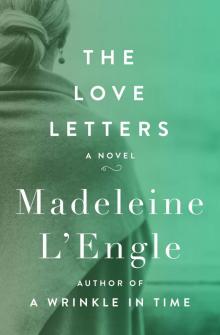 Love Letters
Love Letters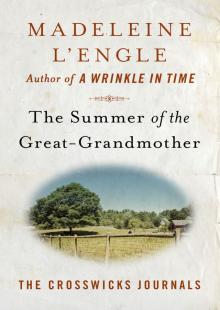 The Summer of the Great-Grandmother
The Summer of the Great-Grandmother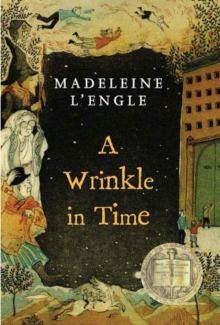 A Wrinkle in Time
A Wrinkle in Time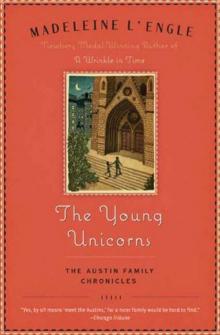 The Young Unicorns
The Young Unicorns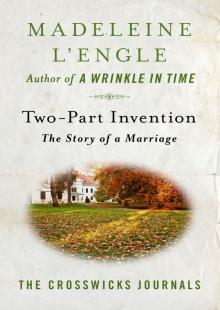 Two-Part Invention: The Story of a Marriage
Two-Part Invention: The Story of a Marriage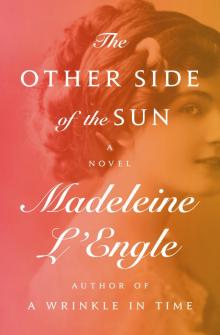 The Other Side of the Sun
The Other Side of the Sun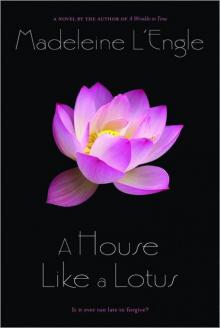 A House Like a Lotus
A House Like a Lotus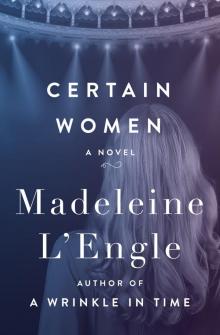 Certain Women
Certain Women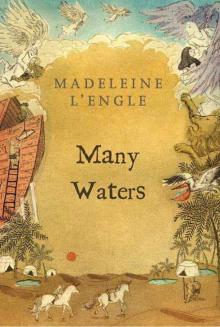 Many Waters
Many Waters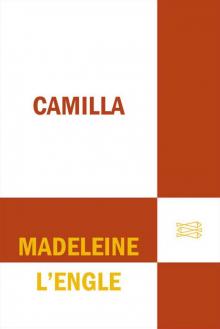 Camilla
Camilla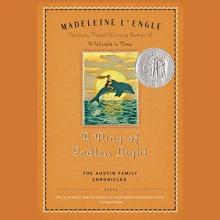 A Ring of Endless Light
A Ring of Endless Light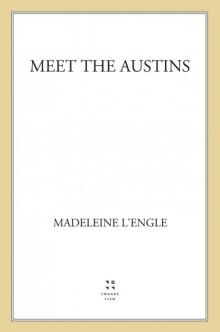 Meet the Austins
Meet the Austins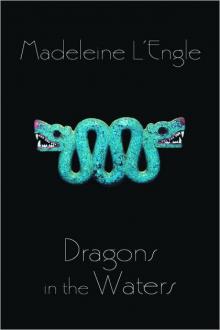 Dragons in the Waters
Dragons in the Waters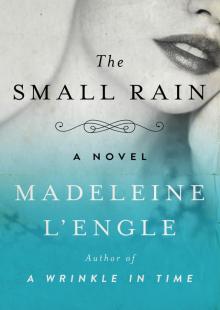 The Small Rain
The Small Rain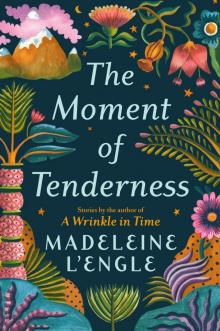 The Moment of Tenderness
The Moment of Tenderness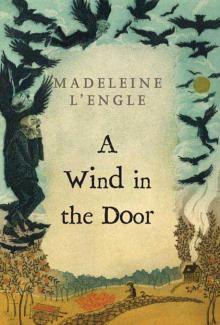 A Wind in the Door
A Wind in the Door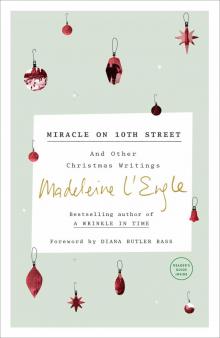 Miracle on 10th Street
Miracle on 10th Street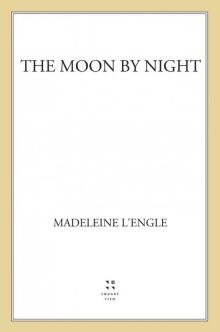 The Moon by Night
The Moon by Night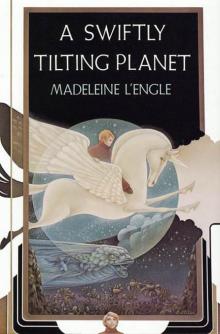 A Swiftly Tilting Planet
A Swiftly Tilting Planet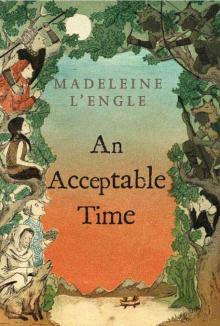 An Acceptable Time
An Acceptable Time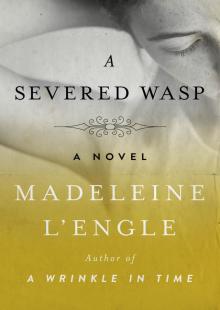 A Severed Wasp
A Severed Wasp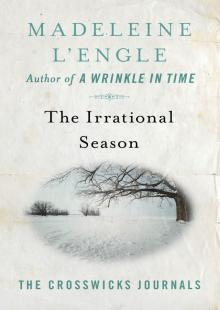 The Irrational Season
The Irrational Season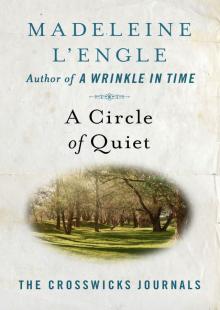 A Circle of Quiet
A Circle of Quiet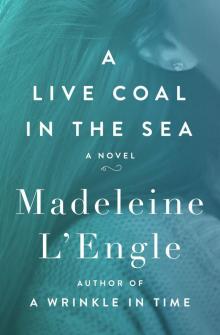 A Live Coal in the Sea
A Live Coal in the Sea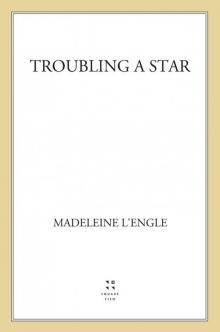 Troubling a Star
Troubling a Star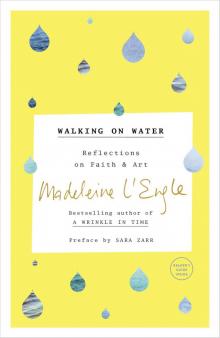 Walking on Water: Reflections on Faith and Art
Walking on Water: Reflections on Faith and Art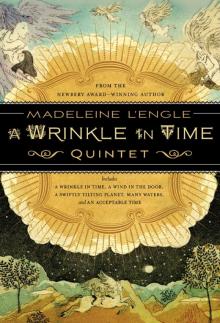 A Wrinkle in Time Quintet
A Wrinkle in Time Quintet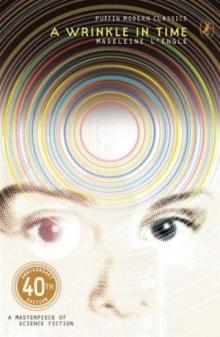 Wrinkle in Time
Wrinkle in Time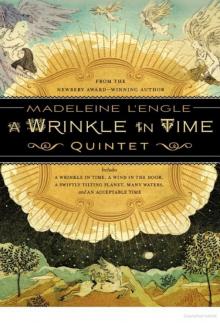 The Wrinkle in Time Quintet
The Wrinkle in Time Quintet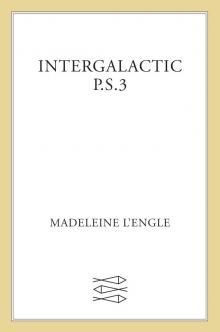 Intergalactic P.S. 3
Intergalactic P.S. 3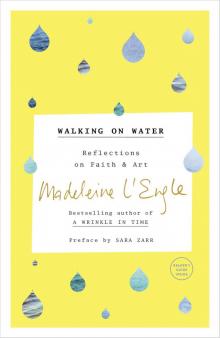 Walking on Water
Walking on Water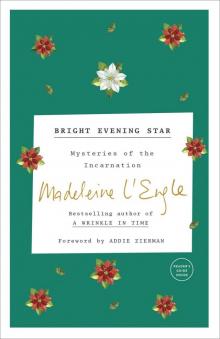 Bright Evening Star
Bright Evening Star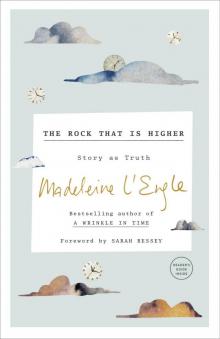 The Rock That Is Higher
The Rock That Is Higher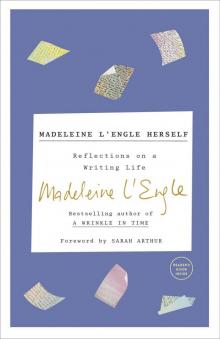 Madeleine L'Engle Herself
Madeleine L'Engle Herself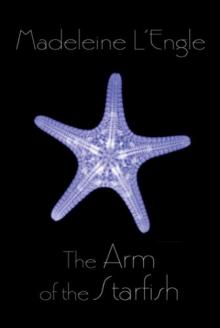 The Arm of the Starfish
The Arm of the Starfish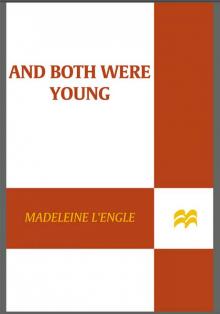 And Both Were Young
And Both Were Young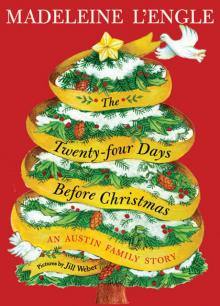 The Twenty-four Days Before Christmas
The Twenty-four Days Before Christmas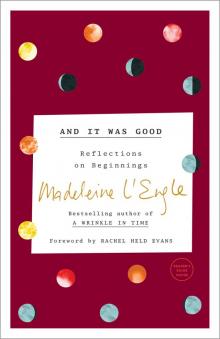 And It Was Good
And It Was Good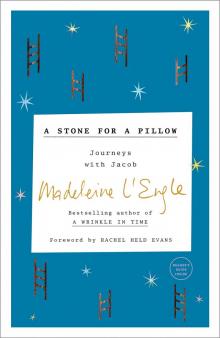 A Stone for a Pillow
A Stone for a Pillow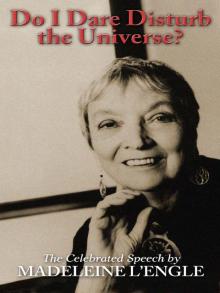 Do I Dare Disturb the Universe?
Do I Dare Disturb the Universe?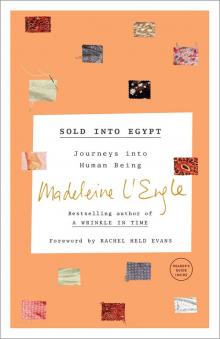 Sold into Egypt
Sold into Egypt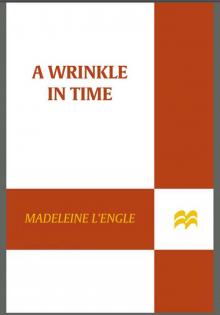 A Wrinkle in Time (Madeleine L'Engle's Time Quintet)
A Wrinkle in Time (Madeleine L'Engle's Time Quintet)